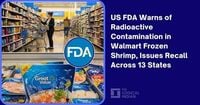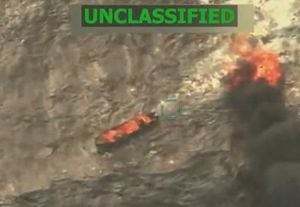On August 21, 2025, consumers across the United States awoke to alarming news: Walmart, the nation’s largest retailer, had issued a sweeping recall of its Great Value brand frozen raw shrimp. The move came after the U.S. Food and Drug Administration (FDA) discovered evidence of radioactive contamination in shipments arriving from Indonesia, triggering a rapid response to safeguard public health.
The FDA’s warning, echoed by outlets such as Forbes and the Associated Press, centered on the detection of the radioactive isotope Cesium-137 (Cs-137) in shrimp shipments destined for Walmart stores. Customs and Border Protection (CBP) identified the contamination at four major U.S. ports: Los Angeles, Houston, Miami, and Savannah, Georgia. The affected shrimp originated from Indonesian supplier PT. Bahari Makmur Sejati, known in some reports as BMS Foods.
While the shrimp had not yet reached Walmart shelves, the FDA acted swiftly, urging a recall out of what it described as “an abundance of caution.” The agency emphasized that while contamination levels were below its formal intervention thresholds, the risk—however remote—of radioactive exposure was too great to ignore. In a statement summarized by The Logical Indian, the FDA underscored the importance of “minimizing consumer exposure” and maintaining the highest standards of food safety, especially given the complexities of global supply chains.
Consumers were advised to check their freezers for specific lot numbers: 8005540-1, 8005538-1, and 8005539-1, all stamped with a sell-by date of March 15, 2027. The affected products were distributed to Walmart stores across 13 states: Alabama, Arkansas, Florida, Georgia, Kentucky, Louisiana, Missouri, Mississippi, Ohio, Oklahoma, Pennsylvania, Texas, and West Virginia. The FDA recommended that anyone in possession of the recalled shrimp either discard the product immediately or return it to the place of purchase for a full refund.
The source of the contamination, Cesium-137, is a radioactive byproduct commonly associated with nuclear reactors and medical equipment. According to the FDA and health experts cited in the reports, consuming food contaminated with Cs-137 poses significant health risks, including an increased likelihood of developing cancer, radiation sickness, and, in severe cases, death. The agency’s recall notice left no room for ambiguity: “Do not eat or serve the affected shrimp. Discard them immediately.”
Interestingly, while no shrimp products tested positive for Cs-137 in direct food samples, the presence of the isotope in shipping containers and a single breaded shrimp sample raised enough concern for regulators to halt further imports. The FDA found that the implicated Indonesian processor had violated the Federal Food, Drug, & Cosmetic Act by operating under “insanitary conditions whereby it may have become contaminated with Cs-137 and may pose a safety concern.” As a result, the supplier was placed on a so-called “red list,” effectively banning its shrimp from entering the United States until all violations are resolved.
Walmart, for its part, responded quickly to the FDA’s recommendations. The company worked in close concert with regulators to remove the affected shrimp from shelves in the impacted states. According to the Associated Press, Walmart’s recall demonstrates the retailer’s commitment to consumer safety and food quality, even when the risk is as rare and unexpected as radioactive contamination.
The episode highlights the rigorous food safety protocols that govern America’s food supply. Routine inspections by Customs and Border Protection and the FDA are designed to catch even the most unlikely threats. In this case, the system worked as intended: the contaminated shipments were intercepted before reaching consumers, and a voluntary recall was issued to ensure that no potentially hazardous products slipped through the cracks.
Despite the swift action, the incident has left many shoppers uneasy. The idea of radioactive shrimp—no matter how improbable—has sparked concern and, in some cases, confusion. Experts interviewed by The Logical Indian and other outlets urge consumers not to panic but to remain vigilant. They recommend following all recall instructions to the letter, washing hands after handling any potentially contaminated products, and cleaning surfaces thoroughly. “Food products suspected of contamination, especially radioactive material, should never be consumed,” one expert advised.
For those worried about the broader implications, it’s worth noting that low-level background radiation is a fact of life. Trace amounts of radioactive materials exist naturally in soil, air, and even food. However, prolonged exposure to elevated levels—such as those that might occur from consuming contaminated shrimp—can pose real health risks. The FDA’s recall, while precautionary, serves as a reminder of the importance of robust oversight in a globalized food market.
In the wake of the recall, the FDA has barred future imports from PT. Bahari Makmur Sejati until the company can demonstrate compliance with U.S. safety standards. The agency is also working with international regulators to trace the source of the contamination and prevent similar incidents in the future. This multilayered response underscores the critical role of transparency, traceability, and international cooperation in maintaining food safety.
For consumers, the message is clear: check your freezer, heed the recall, and don’t take chances with your health. The FDA’s actions, supported by Walmart’s cooperation, have likely averted a more serious public health crisis. As the investigation continues, the episode stands as a testament to the vigilance required to keep America’s food supply safe—even from threats as unusual as radioactive shrimp.
With the contaminated shipments now under control and regulatory agencies on high alert, shoppers can take some comfort in knowing that the system, though not infallible, is designed to catch even the most unexpected hazards. For now, the advice remains simple and direct: if you have any Great Value frozen raw shrimp with the specified lot codes and sell-by date, don’t eat it. Dispose of it safely, or return it for a refund. Your health—and peace of mind—are worth it.





